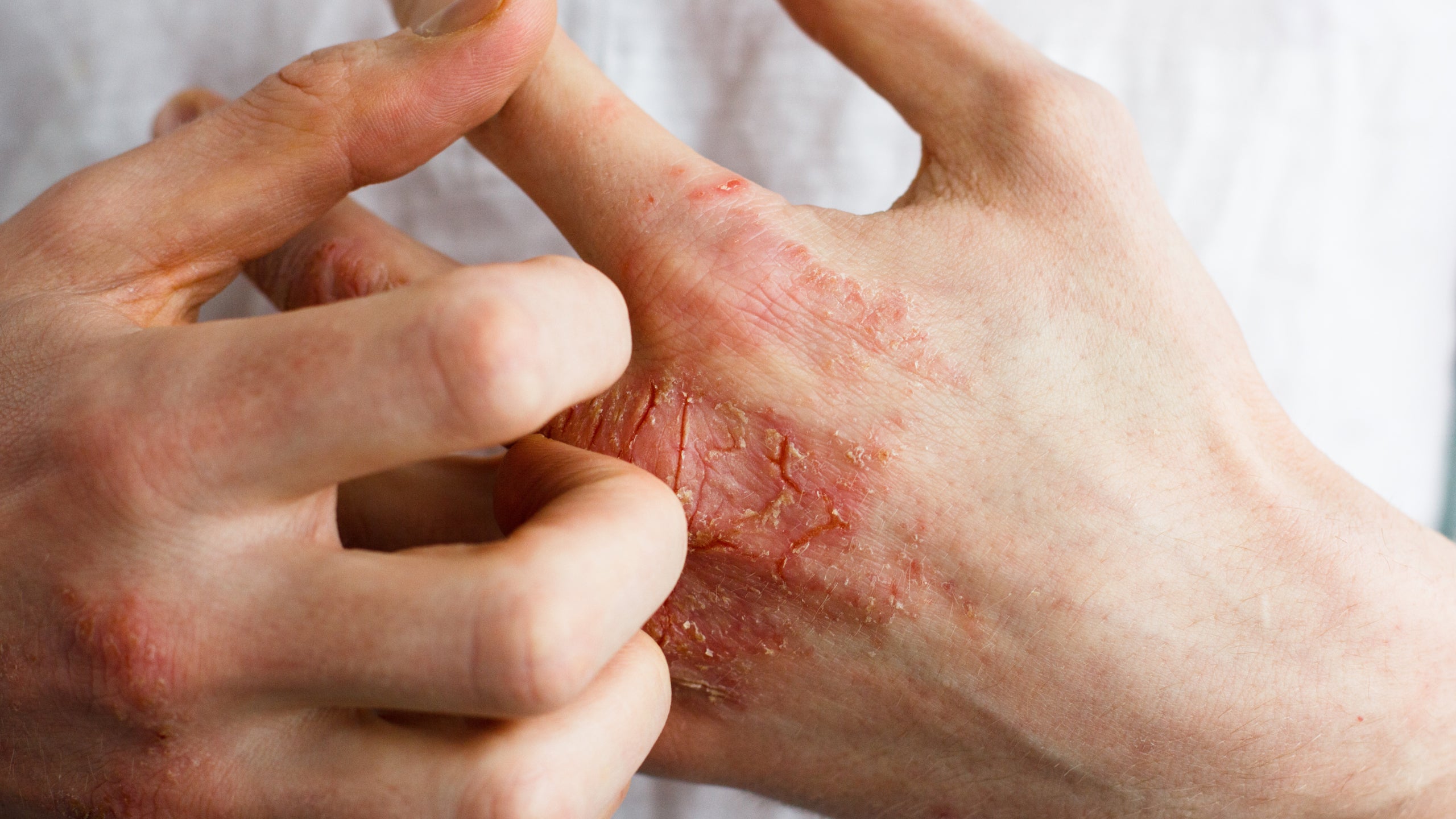Eczema is often referred to as the “itch that rashes.” That’s because the itch associated with eczema is persistent and pervasive.Eczema can be so itchy that it disrupts your sleep, work, school, focus, and social life. That’s why lessening itch is crucial to experiencing relief from eczema.
Why Does Eczema Itch?
Like the cause of eczema, the cause of itching in eczema is complicated. Many mechanisms, factors, and nerve pathways have been identified as playing a role in itch.
In general, the itch associated with eczema originates from the skin. It occurs when free nerve fibers get stimulated by nerve endings called C fibers in the epidermis, the top layer of skin. These nerve endings can get stimulated by eczema flare-ups, general dry skin, environmental irritations, or chemical mediators in the skin.
The itch in the skin then activates nerve pathways that send messages to the brain — that often result in scratching.
Sometimes people with eczema can even experience psychogenic itch. It’s defined as an itch stimulated by psychological factors, rather than physical ones. Someone with eczema may experience unconscious urges to scratch, may develop a scratching habit, or may feel the need to scratch in response to stress.
What Triggers Eczema to Itch?
Sometimes eczema can be more itchy and inflamed than other times. Environmental and lifestyle triggers that can cause itch include:
- Hay fever
- Stress
- Hot, humid weather
- Cold, dry weather
- Sweating
- Hot showers
- Food sensitivities
- Chemicals in household cleaners, including laundry detergents
- Skin care products with artificial fragrances or preservatives
- Wool clothing
What Happens When You Scratch Eczema
Scratching eczema often leads to the “itch-scratch cycle.” When your skin is itchy, you scratch it, which increases inflammation and further damages your skin barrier, leading to more dry, itchy skin
Scratching greatly increases your risk of skin damage, including painful broken and bleeding skin. Broken skin leaves you at a greater risk of infection and allows the irritants to enter the skin and worsen your eczema flare-up.
Another form of skin damage often caused by scratching includes discoloration. Chronic eczema leads to lichenification — thicker, leathery patches of skin that can appear darker than your normal skin tone. Scarring is also possible.
How to Reduce Eczema Itching
Telling someone to stop scratching itchy eczema isn’t realistic. The urge to itch is strong and regularly becomes habitual. That’s why the best way to stop scratching and to prevent skin damage is to get to the root of the eczema itch. Reduce itching by:
1. Moisturizing
Long or hot showers, frequent handwashing, and harsh soaps and detergents can all throw your skin microbiome off balance and break down the skin’s natural protective barrier, contributing to dry skin, itch, and inflammation. Moisturizing frequently—especially if you’ve just taken a shower or washed your hands—and ensuring a balance of good and bad bacteria on the skin can help reduce eczema redness and itch.
We recommend Gladskin Eczema Cream, which restores balance to the skin microbiome as it moisturizes so the skin can heal. Steroid-free, clinically tested, cleanly formulated, four out of five users experience reduced itch and redness.
2. Avoiding Triggers
The list of possible eczema triggers is long, making identifying your personal triggers difficult. However, if you can avoid some of the most common eczema triggers, you may see an improvement in the severity and frequency of your eczema symptoms, including itching. Irritation from household chemicals, fragrances, dust, stress, food allergies, and extreme weather can all trigger eczema. Avoiding these likely won’t cause your eczema to go away completely, but when paired with an eczema treatment plan, you can see a major improvement in your quality of life.
3. Cognitive Behavioral Therapy
Chronic itch can cause rumination, where a person with eczema obsessively thinks about their itch. Increased awareness around your itchy rash can lead to increased scratching and unhelpful patterns of thinking. Cognitive behavioral therapy has been shown to help reduce rumination and is thought to be a non-invasive way to reduce itching.
Chronic itch has also been shown to activate the same areas of the brain as stress and pain. Meditation is a helpful tool to deactivate those areas. One study found that participants who completed meditation sessions had an improved quality of life and outlook on their skin condition.
4. Evaluating Your Eczema Treatment with Your Doctor
Some people can control their eczema and itch through lifestyle adjustments alone; however, if you have severe eczema, you may need prescription medication. If you aren’t seeing improvements in your rash with at-home treatment, discuss with your doctor which treatments may be right for you.
Newer eczema therapies like Dupixent and topical JAK inhibitors show promise at reducing itch. In clinical trials, over half of participants using Dupixent reported their eczema symptoms were reduced by 75% after 16 weeks. A 2021 study on JAK inhibitors found that they rapidly reduced itching and significantly improved inflammatory lesions.
Moving Forward With This Itchy Condition
Itch can affect your sleep, mental health, confidence, focus, and overall quality of life. Understanding how itch works and implementing an eczema treatment plan can help you regain your comfort and confidence. Applying Gladskin Eczema Cream, avoiding triggers, and moisturizing daily can help alleviate your symptoms. If you find at-home treatment isn’t working for you, visit your primary health care provider or a board-certified dermatologist to help get you on your way to healthy, happy skin.

